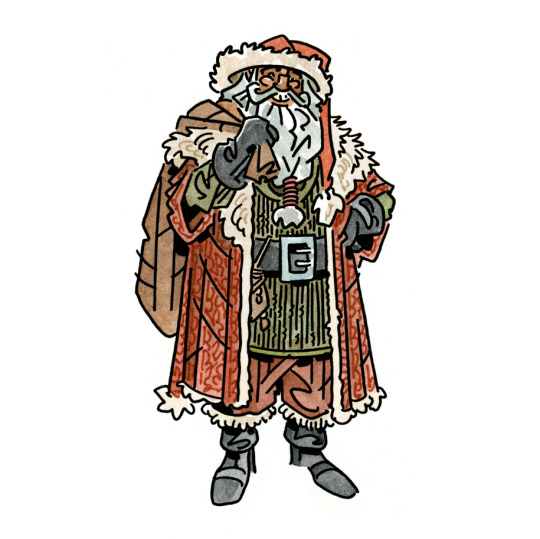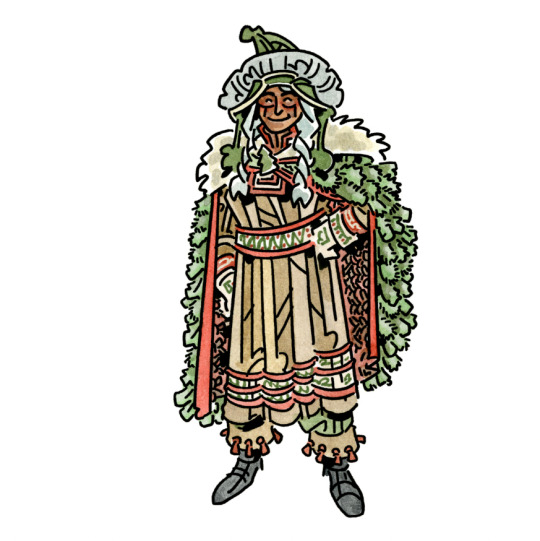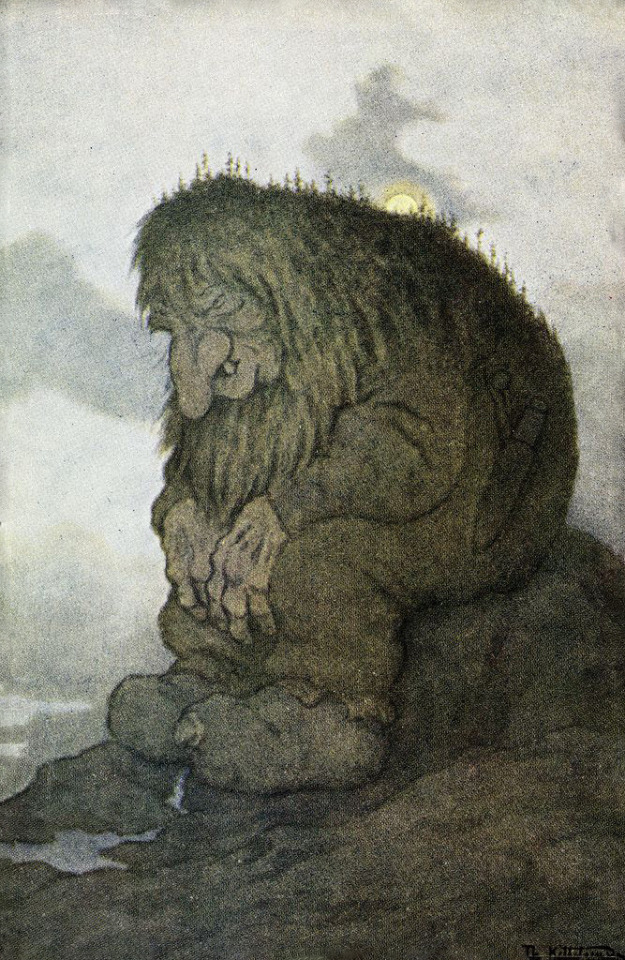Text
We need to bring back private rail cars as the cool, sexy, exclusive way to travel, so instead of dumping the carbon budget of a small nation in the global south on private jets, celebrities have to attach their luxury pull an cars to the back of an Amtrak. Then the celebrities will lobby for Amtrak lines to be better
Seriously when did this

Become sexier than this


Like isn't it nice to watch the scenery, to be able to open a window and have fresh air, to be able to stand up all the way, not have your ears pop?
101K notes
·
View notes
Text

Companions of Christmas day 4: Chyskhaan, Khaarchana, and Ekhe Dyyl
Chyskhaan
One of two traditional giftgivers of the Yakut of Siberia (the other being Ekhe Dyyl), Chyskhaan lives north of Oymyakon, the coldest town in the world. Since time began, people have brought him gifts on the longest night of the year as a tribute, in the hopes that he will mitigate the cold and allow warmth and daylight to return to Siberia (though slowly and evenly, that the villages might not be flooded from the snow melt).
He spends the week of Christmas going through the offerings and taking what he will need for the year, and then, on New Year’s, he distributes the remaining majority of gifts to children and those in need who, regardless of their station, are treated by Chyskhaan with the dignity and ceremony as would befit a king or queen.
Ekhe Dyyl
Ekhe Dyyl is one of two traditional giftgivers of the Yakut people of Siberia (the other being Chyskhaan). Whereas Chyskhaan is imperious and icy, a reminder of the command that winter holds over the lives of those who live most deeply in its grip, Ekhe is warm and unpretentious, a proud bumpkin and boisterous reveler who rides a dirty, shaggy bull named Ükerinto into the towns and villages he visits.
When presented with a bowl of delicious mare’s milk, Ekhe will wave his brushwhip over a child and a gift will appear in their hands.
Khaarchana
Khaarchana is the granddaughter of both Chyskhaan on her mother’s side and Ekhe Dyyl on her father’s. From birth, she learned to bounce back and forth between their very different holiday celebrations and expectations. Chyskhaan’s reverent and solemn traditionalism and Ekhe’s edacious, riotous merrymaking are often at stark contrast, as are the grandfathers themselves: Chyskhaan has, on more than one occasion, called Ekhe a classless, gluttonous yokel, and Ekhe has let Chyskhaan know that the former considers the latter a stuffy, bumptious snob.
When the winter giftgivers were, for a generation, expelled from Russia following its revolution, Khaarchana realized that children across Siberia would suffer greatly from the absence of her grandfathers. Despite the danger posed by Stalin’s minions and the difficulty in reconciling the two seemingly different approaches to the holidays, Khaarchana decided to fill their shoes, making sure that no child in (what is now) the Sakha Republic would go without during winter festivities, and that the festivities themselves would be as rich and wonderful as they had ever been.
Going in with no experience, she consulted the longtime friend and colleague of both grandfathers, Santa Claus, whose advice was to be true to herself. The celebrations of the winter holidays are always changing and growing, and reverence and merrymaking needn’t be mutually exclusive.
Knowing the peril that her mission would put her in, Santa gave Khaarchana a magical snowflake, which, when worn on her head, would render her invisible, allowing her to plan and maneuver under the eyes of the Russian secret police, only removing it and allowing herself to be seen on the New Year when she would hand out the presents she had strategically hidden in homes across Siberia.
When her grandfathers were eventually permitted to return to the Russian-controlled region, they found that Khaarchana had kept the spirit of love and giving alive during their absence, and had unified their two approaches into one one messy, inconsistent, glorious celebration. Though both were resistant to change, and to each other, Chyskhaan and Ehke began to accompany Khaarchana on her rounds, and, though they still bicker like old hens, they have become close friends, while Khaarchana, in addition to her role as giftgiver, is the patron of all who have to navigate the sometimes-conflicting holiday celebrations (and schedules) of more than one family.
••••••••••••••••••••••••••••••••
Happy December, friends! Each year around this time I post up drawings of Christmas and other winter holiday figures, along with narratives to explain the practices with which folklorists and holiday buffs might be familiar. When stories exist, I use them; when they don't, I do what I can to piece together what folklore surrounds them to fill in the gaps (or, in some instances, defer to the theories of my friend and fellow narrative reconcilianist Benito Cereno). I hope you enjoy them!
118 notes
·
View notes
Text

Companions of Christmas, Day 3: Père Fouettard
Père Fouettard was a butcher and cook whose tavern was visited by three children on their way to boarding school. Seeing their nice clothes, wicked Fouettard assumed that they must be rich, and, being children, would be easy to rob. He killed them with his carving knives, chopped them up, and closed up their remains in a pickle barrel, intending to serve them as meat to his unwary customers to get rid of the evidence of his crime, pocketing the money that they had carried and congratulating himself on how efficiently he had performed this dastardly deed.
That night, his tavern had a visitor – Nicholas, Bishop of Myra, who was ever aware of the plight of children in danger. The evil Fouettard did not want the saintly bishop in his establishment, so when Nicholas requested a hearty supper, Fouettard replied that he had no meat.
“What’s in that barrel, then?” asked Nicholas, who clapped his hands, and the three youngsters, miraculously returned to life and wholly intact, leapt from the barrel. Fouettard was brought to his knees in terror by the evidence of Nicholas’s miraculous goodness, and begged Nicholas to show him mercy.
Nick suggested that the most merciful thing he could do would be to give Fouettard the opportunity to right his wrongs through contrition and service, and ever since that day Père Fouettard has been Nick’s cook, working first to feed the hungry of Myra during Nick’s earthly lifetime, and then as the head cook at the North Pole, satisfying the appetites of the Clauses, their companions, the elves, and any visitors who might stop by.
Though reformed in spirit, Père Fouettard is still short-tempered and surly, and kids in France, Belgium, and the French-speaking cantons of Switzerland know to steer clear of him when he accompanies St. Nicholas on his holiday visits.
••••••••••••••••••••••••••••••••
Happy December, friends! Each year around this time I post up drawings of Christmas and other winter holiday figures, along with narratives to explain the practices with which folklorists and holiday buffs might be familiar. When stories exist, I use them; when they don't, I do what I can to piece together what folklore surrounds them to fill in the gaps (or, in some instances, defer to the theories of my friend and fellow narrative reconcilianist Benito Cereno). I hope you enjoy them!
#père fouettard#christmas#christmas legends#christmas stories#christmas traditions#christmas art#repost
81 notes
·
View notes
Text

Companions of Christmas, Dec 1: Santa Claus
Santa or Saint Nicholas (“Santa” means “Saint,” and “Claus” is short for “Niklaus/Nicolas) was born to wealthy parents in a small port city in Asia Minor. Nicholas became a gift-giver at a young age when, upon learning that three sisters who wished to wed their loves could not do so because they had no dowry with which to pay their future husband’s family, he tossed coins through their window in the dead of night. Finding that he could so easily change lives for the better and bring hope to those who had little through these small acts of generosity, he sold his property and belongings and used the money to continue helping those he found in need. As he was already following his god Jesus’s order “sell what you possess and give the money to the poor,” it was only natural that he would adhere to the next dictate “then come, follow me,” which he did, becoming first a Christian priest, and, soon after, the bishop of Myra.
Nicholas, a noted brawler even during his bishophood, never backed down from a fight in service to others. He frequently found himself rescuing the innocent from execution, saving children from those who would exploit them, and battling monsters and creatures long viewed by the Christians as servants of evil. But instead of killing these foes, Nick would recruit them. Using both force and Christian magic, he would make them accompany him on his errands and missions of mercy, and the exposure to his generosity and kindness changed their perception and their hearts, turning them from forces of destruction to forces of good, though few lost any of their wildness.
Nicholas was born a mortal man, and died one, at the age of seventy-three, on December 6, 343. His devotion to his faith and service to his neighbors ensured his place in heaven, but heaven was no paradise for Nick, who fretted constantly for the children of the world. He petitioned the three aspects of God for a charter, to return to earth and bring joy and comfort to its children through acts of charity and joy. His charter was granted, and he returned to earth one year later, and he has done his good works each December since.
••••••••••••••••••••••••••••••••
Happy December, friends! Each year around this time I post up drawings of Christmas and other winter holiday figures, along with narratives to explain the practices with which folklorists and holiday buffs might be familiar. When stories exist, I use them; when they don't, I do what I can to piece together what folklore surrounds them to fill in the gaps (or, in some instances, defer to the theories of my friend and fellow narrative reconcilianist Benito Cereno). I hope you enjoy them!
#santa#santa claus#st. nick#st. nicholas#santa art#saint nicholas art#christmas#christmas stories#christmas art#repost
128 notes
·
View notes
Text

Companions of Christmas, Day 2: Mrs. Claus
Mrs. Claus was once better known by her given name, Alba. She was the nymph of the silver fir tree, a captain in the retinue of the Greek goddess Artemis, and she first met St. Nicholas when he came to do battle with her Lady.
Nick was on a campaign to destroy Artemis's shrines and temples in his Asia Minor diocese in order to keep the Christians in his flock from “backsliding” into paganism. In these attempts, he frequently had to fight Artemis and her retinue, including Alba.
Over the years, Nick and Alba often ran into each other on the same errands of mercy, coming to the aid of a child or creature in peril. Although both were pledged to see the other undone, they found themselves allies in these ventures, first reluctantly, then enthusiastically.
Over the course of many decades and many encounters, Alba came to fall in love with Nick because of his kindness, generosity, and, above all, his fierce devotion to and protection of children, which mirrored her own. And Nick fell in love with Alba because of her unwillingness to stand by while the weak were harmed, the patience with which she sought to understand those who were different from her (patience and tolerance both being virtues that Nick clearly needed a lot of help learning), and the unmitigated joy she took from the natural world and its wonders.
Alba brokered a peace between Nick and Artemis (who presented him with her famous flying deer as a sign of peace and a means by which to better undertake his mission), married Nick, and now stewards the great fir forests of the North Pole, acting as protector and champion to the many creatures who find sanctuary there.
••••••••••••••••••••••••••••••••
Happy December, friends! Each year around this time I post up drawings of Christmas and other winter holiday figures, along with narratives to explain the practices with which folklorists and holiday buffs might be familiar. When stories exist, I use them; when they don't, I do what I can to piece together what folklore surrounds them to fill in the gaps (or, in some instances, defer to the theories of my friend and fellow narrative reconcilianist Benito Cereno). I hope you enjoy them!
141 notes
·
View notes
Photo

“Trollet som grunner på hvor gammelt det er“ by Theodor Kittelsen
“(Troll Wonders How Old He Is)”
19K notes
·
View notes
Text
3500 years ago a bunch of people decided to build a tower to the sky and now I have to worry about keeping up my Duolingo streak
204K notes
·
View notes
Text
145K notes
·
View notes
Text
Ok we all talk about the Pevensies’ trauma at returning to Earth at the end of The Lion, the Witch, and the Wardrobe and their trouble readjusting to life there again but think of all the funny/good parts too
They return from the country, and their mom is surprised when all her children hug her at the station. Even Peter, who thinks he’s all grown up. Even Edmund, who went away surly and withdrawn. She doesn’t know her children haven’t seen her in over a decade.
They miss their dear Cair Paravel, but they absolutely do not miss its chamber pots. Indoor plumbing is amazing.
It takes a while to remember how modern technology works, though. How many heart attacks did the siblings give their parents or the professor because they walked into a dark room only to turn on the light and find the children sitting there in the dark. (They were by the window! There was still plenty of light from the sunset! They would have gotten a candle in a minute!) The kids sheepishly remember oh yeah electricity is a thing.
(Edmund has a new electric torch in Prince Caspian. He was so excited to get that torch. Almost more excited than you’d think a kid his age would be, and his parents expect Peter at least to tease him, but the siblings all agree light in your hand at the touch of a switch is terrific.)
Suddenly getting really high grades in some subjects and terrible in others. Their grammar, reading comprehension, spelling, vocab, even penmanship? Amazing. History and geography? They don’t remember anything. One time in class Susan forgets Earth is round and wants to die.
Also they can never remember what the date is supposed to be because Narnia uses different months and years. They can estimate time really well by looking at the sun though, and Edmund at least can always tell which way is north etc without thinking about it (again, using the sun)
Okay but how many times did they go to pick something up or reach something and realize they are so much shorter and less muscled than they expect? It’s a common sight to see Peter climbing on counters to reach a top cabinet, grumbling about how he’s High King this is demeaning. (No he never takes the extra five seconds to grab a stool. He will climb that shelf.)
Peter and Susan being delighted because they are no longer almost thirty. (In a few years Edmund and Lucy will tease them about being old and their parents will not understand.)
Lucy doesn’t have to deal with periods anymore for a few years yet. Susan might not either. Heck yeah
Lucy loves to climb into her siblings’ laps and be cuddled. In Narnia she eventually she grew too big, but now she is small and snuggleable again. Peter is her favorite, and if she’s upset, he’ll tickle her and tell bad jokes until she’s smiling again, but really she loves cuddling with all her family. She grew up without her parents; how many times did she just want to crawl into her mom’s lap and her mom was a world away? Imagine the first time she realizes she can now. Or, imagine one day, a cold and grey sort of day, when the rain is pattering against the windows, and it sounds like the rain on the windows of the Professor’s house, that first day they went exploring. It sounds like the day they played hide and seek. It sounds so like the rain on the windows of Cair Paravel, that if Lucy closes her eyes she can imagine she’s back there, having tea and chatting with Mr. Tumnus before the fireplace of her room, and soon the rain will stop, and they will go out on the balcony and wave to the naiads and the dryads and the mermaids, who have come out to enjoy the rain and visit one other on the banks of the Great River winding past Cair Paravel down to the sea.
But if Lucy looks out the window, all she’ll see is the rain over London, so it’s not only a cold and grey sort of day, it’s a lonely sort of day too.
Susan and Edmund are playing chess in the living room (and they must have studied with Professor Kirke, thinks their mother, because they certainly weren’t that good when they left). Lucy goes over to Edmund, and oh dear, thinks their mother, now he’s going to call her a baby and be horrible to her, but instead he picks her up and puts her on his lap without even taking his eyes off the chessboard; it’s simply a matter of course.
“Doesn’t the rain sound familiar?” says Lucy in a solemn, wistful way.
Their mother doesn’t know what that means, but her siblings must, because Susan says, “Yes, Lu, it does,” and Edmund gives her a little hug with his free arm as she tucks herself under his chin to watch the chess match.
(Five minutes later there is a crash from the next room as Peter falls off a counter. Their mother does not understand the words he must have picked up from the Professor, but he’s grounded for them anyway. His siblings have no respect for their High King, because they refuse to stop laughing.)
18K notes
·
View notes
Text
Write a dramatic poem about the seething depressing feeling of having your covered toast fall butter side down.
3K notes
·
View notes
Text
145K notes
·
View notes









